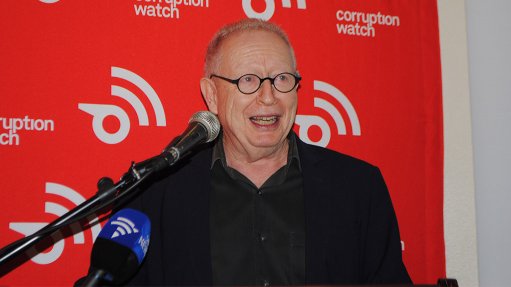
Corruption Watch executive director David Lewis
The latest Transparency International report paints a bleak picture on corruption in Africa, with more than half of those surveyed perceiving corruption to be on the rise – and South Africa emerging as one of the worst performers.
The African edition of the Global Corruption Barometer, released by Transparency International and Afrobarometer on Tuesday, revealed that more than 80% of South African citizens believed corruption had increased since last year, with 79% believing government failed to fight corruption effectively.
“We believe the extraordinarily high number of South Africans who perceive corruption to have increased reflects everyday experience, but particularly reflects public judgment on the Nkandla fiasco,” explained Corruption Watch executive director David Lewis.
This was exacerbated by the emergence of several major corruption scandals, including the allegations surrounding the trains acquired by parastatal, the Passenger Rail Agency of South Africa, and the allegations of corruption between converged network operator Neotel and State-owned Transnet, he added.
However, just over 56% of the respondents in South Africa believed ordinary people could make a difference in the fight against corruption.
Twenty-five per cent of those surveyed in South Africa agreed that reporting corruption would be an effective mitigation measure, with another 22% believing the refusal to pay bribes would be a step in the right direction.
“This is consistent with our experience. In the space of nearly four years, we have received thousands of reports of corruption from the public. That South Africans have refused to accept corruption as a way of life is the most encouraging finding of this survey,” Lewis noted.
Fifty per cent of those surveyed across the continent echoed those sentiments.
However, nearly 60% of African citizens said corruption had increased over the past year, while 22% and 14% believed it had decreased or remained unchanged respectively.
The majority of the continent’s citizens rated every governments’ anticorruption efforts negatively, with 18 out of 28 governments seen as “fully failing” to tackle corruption by a large majority.
The report showed that citizens in Sierra Leone, Nigeria, Liberia and Ghana were most negative about the scale of corruption in their respective countries, while citizens in Botswana, Lesotho, Senegal and Burkina Faso had more positive views.
Police officers and business executives were perceived to be most corrupt and, out of six key public services, people who come into contact with the police and the courts were the most likely to have paid a bribe, the report showed.
However, several smaller countries in sub-Saharan Africa were seen as effectively mitigating corruption, with only a few people paying bribes or where citizens believed they could effectively contribute to stopping corruption.
Afrobarometer surveyed 43 143 respondents across 28 countries in sub-Saharan Africa between March 2014 and September 2015 about their experiences and perceptions of corruption in their country.